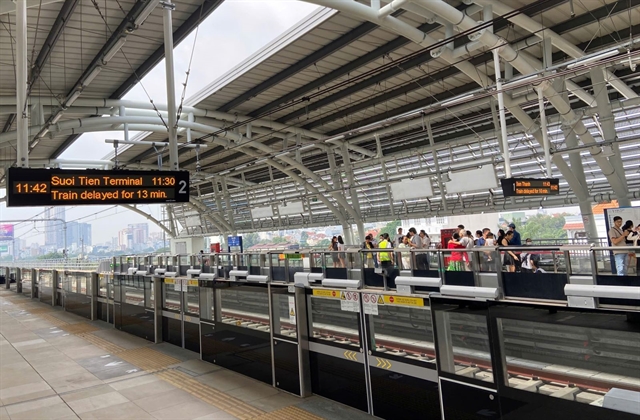HCM City's Metro Line 1 serves 150,000 passengers on opening day
Society – Economy - Ngày đăng : 16:56, 24/12/2024
 |
| Suối Tiên Terminal of HCM City's Metro Line 1. — VNA/VNS Photo |
HCM CITY — The Metro Line 1 (Bến Thành - Suối Tiên) in HCM City witnessed a remarkable turnout of approximately 150,000 passengers on its first day of operation on December 22.
Lê Minh Triết, Director of HCM City Urban Railway No.1 Company (HURC1), the entity managing the metro's operations, said as it was Sunday, city residents flocked to gain first-hand experience on the line, which took 17 years to complete.
Triết said on the next day, the line ran 124 trips from 5am to 4pm, transporting around 14,000 passengers. Many passengers were commuters travelling work and study purposes.
The municipal Department of Transport anticipates the line will operate 200 trips daily, serving about 40,000 passengers. Ridership is expected to surge on weekends and during upcoming holidays. To accommodate the increased demand, HURC1 has proposed increasing train frequency and collaborating with relevant agencies to ensure security and smooth operations.
Metro Line 1 officially began commercial service on December 22, although its formal inauguration has been delayed until after the 2025 Lunar New Year (Tết) holiday.
To encourage ridership, the city is offering free rides for the first 30 days of operation, a programme estimated to cost approximately VNĐ15.7 billion (US$617,000). An additional $17.3 billion will be allocated to support free rides on 17 bus routes connecting to the metro during this period.
The metro, spanning nearly 20km, features 2.6km of underground tracks, three underground stations, and 11 elevated stops. With a total investment of over VNĐ43.7 trillion, the line is equipped with 17 trains, each capable of carrying up to 930 passengers, including 147 seated and 783 standing.
The much-anticipated launch of HCM City’s first metro line is set to improve the city’s transportation, enhance safety, reduce congestion, and stimulate local economic growth, said Fukuda Chihiro, deputy chief representative of Japan International Cooperation Agency (JICA) in Việt Nam ahead of the launch of the line.
The city's population has grown from around 5.3 million in 2000 to over 9.2 million in 2021, leading to increased motorbike and car registrations that strain transportation infrastructure, he said.
The problem has resulted in worsening traffic jams, higher accident rates, more air pollution, and difficulties accessing urban services, all of which hinder the city's socio-economic development, the Japanese official added.
To address the pressing issues, developing a new urban transportation system focused on rail has become crucial, according to Chihiro.
From 2002 to 2004, JICA assisted HCM City in creating a comprehensive master plan for an urban railway system.
In 2006, JICA’s predecessor, JBIC, conducted further research specifically on the metro line, which was prioritised in the overall plan.
The implementation of the metro line aims to meet the growing travel demands of residents while laying the groundwork for a modern and sustainable public transportation network.
“This project represents the strong cooperation and friendship between Việt Nam and Japan, showcasing years of hard work and dedication to bring it to fruition,” he noted.
The metro line is expected to encourage more people to switch from personal vehicles to public transport, helping to alleviate the city's traffic woes.
“The success of the line will pave the way for more projects and developments in the city,” he noted.
He has also pointed out that the project faced several unexpected challenges along the way, including the need to shift underground obstacles, tweak technical specifications, navigate complex contracts, and resolve payment disputes.
"Thanks to the hard work of investors, supervising consultants, contractors, and the proactive support from JICA, many of these issues were effectively tackled.
“We’ve learned a lot from these experiences that will inform our future projects. In our next initiatives, we plan to start discussions about policies and solutions right from the planning stages.”
He emphasised JICA will keep an eye on any outstanding issues and continue to provide maintenance support.
He added Japan is committed to nurturing a long-term partnership with Việt Nam.
"If there are any future requests for assistance, JICA is more than willing to discuss these with the Vietnamese government," Chihiro said. — VNS
